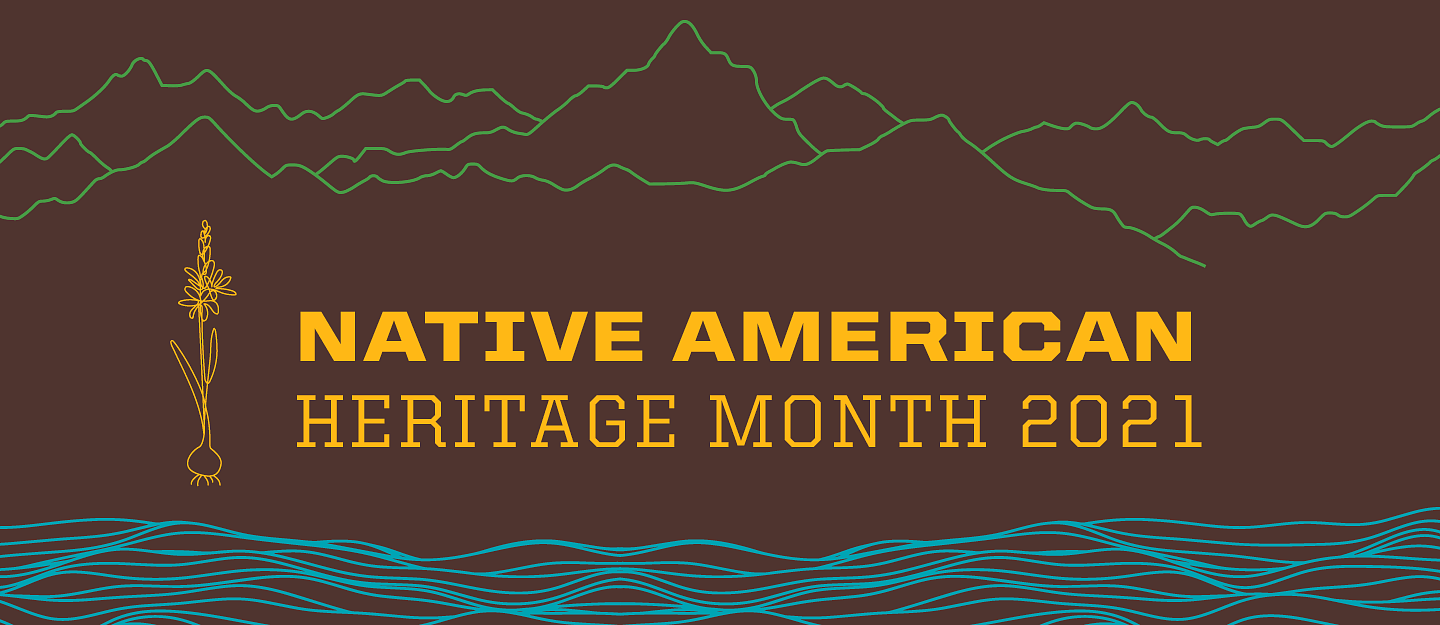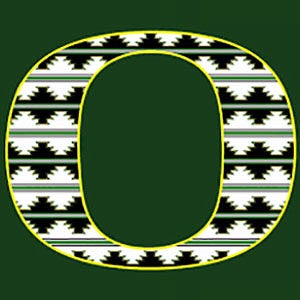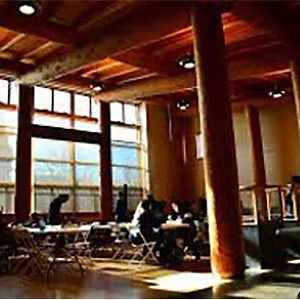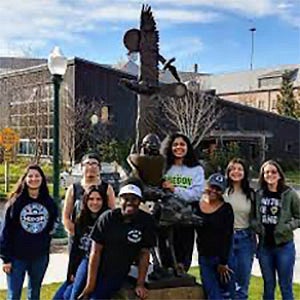
Click to hear this humble greeting in Chinuk Wawa, the Native trade language of western Oregon and the Pacific Northwest:
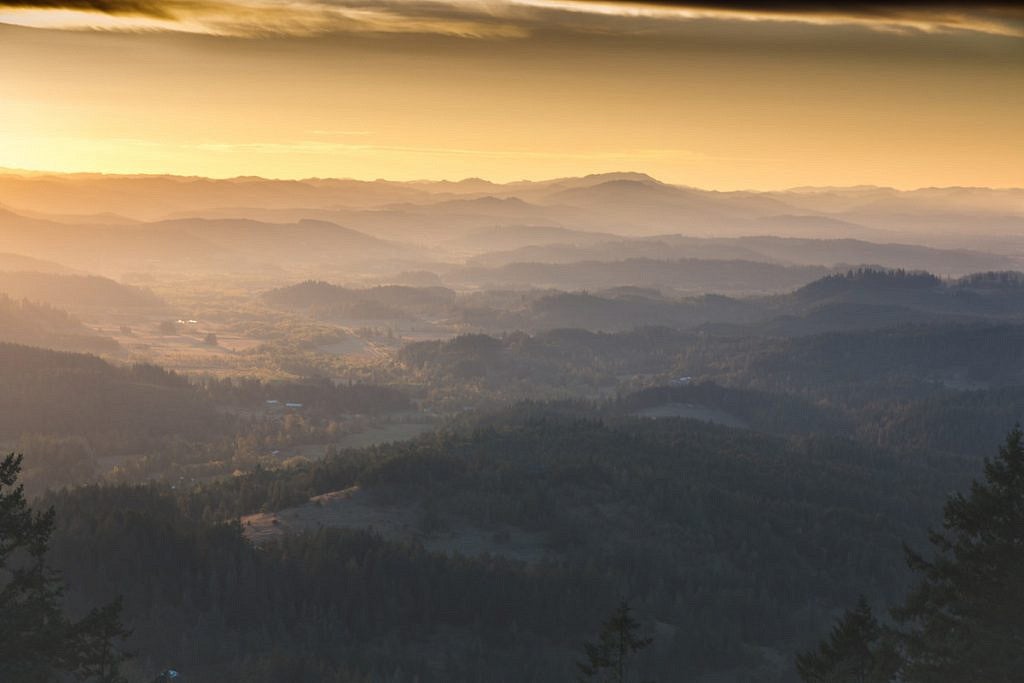
University of Oregon is located on Kalapuya Ilihi, the traditional indigenous homeland of the Kalapuya people. Following treaties between 1851 and 1855, Kalapuya people were dispossessed of their indigenous homeland by the United States government and forcibly removed to the Coast Reservation in Western Oregon. Today, descendants are citizens of the Confederated Tribes of Grand Ronde Community of Oregon and the Confederated Tribes of Siletz Indians of Oregon, and continue to make important contributions in their communities, at UO, and across the land we now refer to as Oregon and throughout the globe.

Native American Heritage Month:
Education, Reflection, Accountability
By Nicole Barney, Klamath Tribal member and Roshelle Weiser-Nieto, Klamath Tribal member, Modoc and Yahooskin Paiute
November is recognized as Native American Heritage Month (NAHM) and is a time for education, reflection, and accountability. For Indigenous people, it can be a time for celebration, but it may also be a time to mourn the loss of our land, genocide of our ancestors, and ongoing settler colonial efforts of Indigenous erasure. While many states have recognized some form of an American Indian Day since 1915, NAHM was officially declared in 1990 by the 41st President of the United States.
We celebrate NAHM this November 2021 on Kalapuya Ilihi (homeland) with gratitude for the knowledge they have shared and their continued contributions to the community and beyond. The Kalapuya people were dispossessed of their homelands, forcibly removed, and today many descendants are citizens of the Confederated Tribes of Siletz Indians and the Confederated Tribes of Grand Ronde.
In honor of NAHM, we invite UO faculty, staff, and students to consider the following:
- Show up as a coconspirator! While allyship can be passive, coconspirators roll up their sleeves, speak out, and help do the work with love.
- Take a listening stance: Talking over others, centering your own feelings, or silencing Indigenous voices is a form of erasure.
- Stay curious: Take learning into your own hands. Be mindful of the emotional labor and toll it takes on Native Americans to continuously educate others about our history and experiences.
- Center Indigenous voices and knowledge throughout the year. Commit to continuing your learning journey this November and beyond.
To our fellow Indigenous Ducks, we hope you find time to celebrate the survivance of our people. We must practice self-care, support one another, and find community in this historically white institution, dominated by Western-centered culture and values. We wish you many blessings and lateral love on your academic and healing journeys. Mo sepk’eec’a!
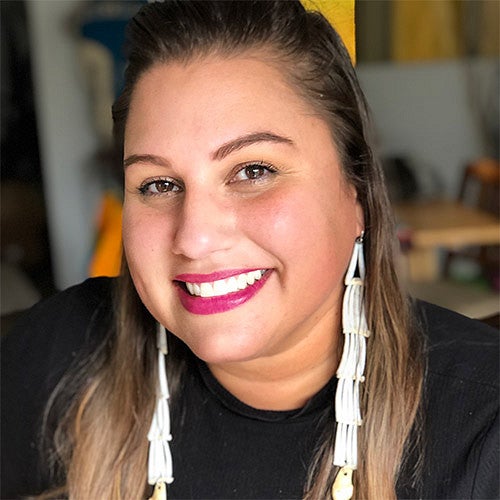
Nicole Barney is a Klamath Tribal member from Chiloquin, Oregon, a Sapsik'ʷałá Alumni (2010) and a doctoral candidate in the Department of Special Education and Clinical Sciences. Her research is centered around research practice partnerships, and suicide prevention and mental health promotion among rural AI/AN youth.
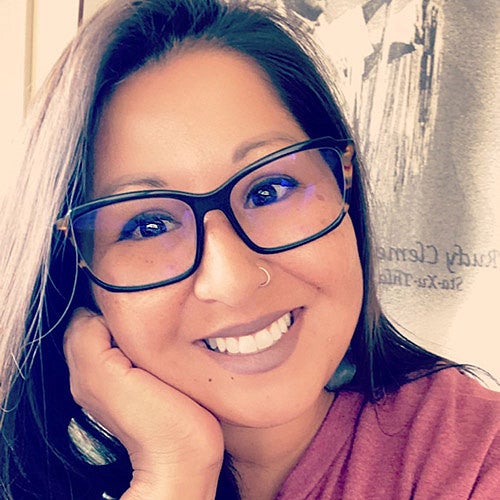
Roshelle Weiser-Nieto is also a Klamath Tribal member, Modoc and Yahooskin Paiute. She is a triple Duck, earning a BA in ethnic studies in 2006, an MEd in 2010 from UOTeach and Sapsik'ʷałá, and now a third-year doctoral student in critical and socio-cultural studies in education. Her research is focused on Indigenous pedagogy, ethnic studies, and historical healing.
Student Highlight:
Stacia Henry, Paiute
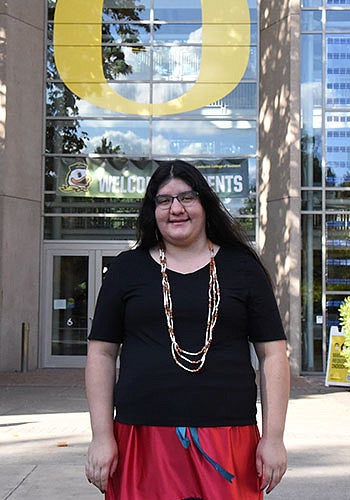
Celebrating Native American Heritage Month at the University of Oregon means being with community. It has been such a great opportunity for me to attend events that occur during Native Heritage Month.
My name is Stacia Henry and I am Paiute from the Pyramid Lake Paiute Tribe located in Nixon, Nevada. I am a junior studying family and human services with a minor in Native American Studies. I work at the Many Nations Longhouse as an assistant steward on campus. In 2018–19, I was a part of the second Native American and Indigenous Studies Academic Residential Community cohort, which is for Native and Indigenous students to take classes together and build community. Being a part of this cohort pushed me to find community on campus as a first-year student and join the Native American Student Union (NASU) group.
During my first-year experience, I helped NASU with their events, including Indian taco sales, preparing for Thursday night potlucks, the Mother’s Day Powwow, and Indigenous People’s Day (IPD). At this year’s IPD, I had the tremendous honor to sing a traditional tribal flag song in my Native language. I am grateful to be involved with the Native community and share the knowledge I have with Indigenous students. Sharing my culture while at the UO is how I continue to practice my cultural traditions.
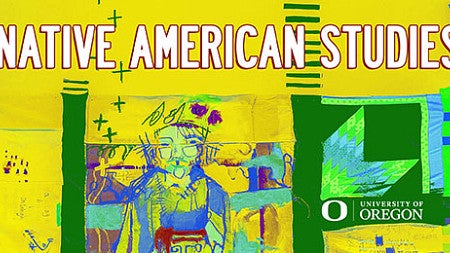
Native American and Indigenous Studies is an interdisciplinary field that uses multiple approaches from history, anthropology, law, literature, ethnic studies, and other disciplines to understand Native American history, culture, politics, and contemporary lives. NAIS highlights the unique place of tribes in the state-tribal-federal intergovernmental matrix and the myriad of distinct issues Native peoples of the United States face, from language and cultural protection to environmental issues to economic development and beyond…UO NAIS affords students extensive grounding in Indigenous history and culture as well as nuanced understanding of tribal sovereignty, Indigenous nationhood, settler colonialism, and the diversity and beauty of contemporary Indigenous lives and experiences. The NAIS interdisciplinary major has two tracks: a conventional track and a language track. The NAIS minor complements numerous other fields of study and provides access to ways of knowing and living that are part of the heritage and future of this state, and this nation.
Native American and Indigenous Studies
| Term | Instructor | Course |
|---|---|---|
| Fall 2021 | Jennifer O'Neal |
Intro to Native American Studies |
| Fall 2021 | Jennifer O'Neal | Native American Activism |
| Spring 2022 | Jennifer O'Neal | Indigenous Peoples of Oregon |
| Spring 2022 | Brian Klopotek | Native Americans & Documentary Film |
| Spring 2022 | Jennifer O'Neal | Indigenous Methodologies |
| Winter 2022 | Brian Klopotek | Introduction to Native American Studies |
Alumni Spotlight

Jana Schmieding is the breakout star and a writer on NBC Peacocks’ sitcom, Rutherford Falls. She is a member of the Lakota tribe and is a comedian, actress, podcaster, and writer. She graduated from the UO with a degree in theater arts in 2005.
In this podcast episode, Smeiding speaks with fellow alumna Tahira Hayes, BA ’05 (journalism), who is the host of the Tall Hungry Girl Talks podcast. Rutherford Falls is the first tv show picked up by a major network that was co-created and written by Indigenous people and features Indigenous lead characters. During the interview, Jana also reflects on some of her favorite memories from attending the University of Oregon.
BE Rezlient with Tracie Jackson (Dine)
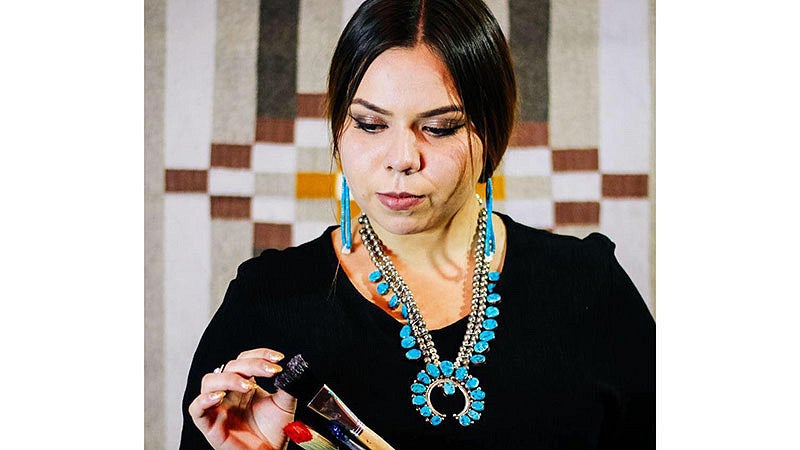
Tracie Jackson is Diné Indigenous artist and designer and an UO alumna focused on the intersectionality between culture, sport, and design. Jackson is focused on creating authentic representation for BIPOC in the sportswear industry. Growing up on and off the Navajo Reservation in Northern Arizona she was raised by an artisan family full of weavers and silversmiths making her a fourth generation Diné artist. At age 14, she saw her future in the N7 logo she had seen at a Native basketball tournament. She had never seen Native representation in the sports world like it, so she made it her goal to be N7’s designer. In 2021, she started her art shop called Rezilient Soles focused on the intersectionality between sportwear and Indigenous culture. The artwork, ranging from overt Indigenous designs to Indigenous craftsmanship, is done with a sports twist.
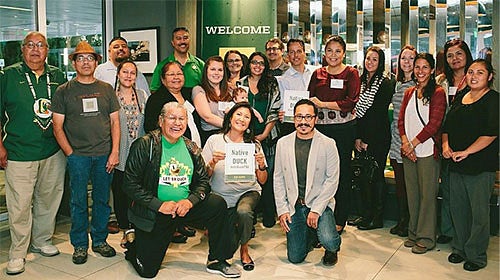
The Native Duck Nation strives to create opportunities for Native American Duck alumni to network, socialize and meet other alumni, students, faculty, staff and community partners. The Network provides a space for alumni to stay connected with the cultural development of the campus community, as well as build upon their own experiences.
140 UO Graduates to attend Auntie Way Writing Retreat
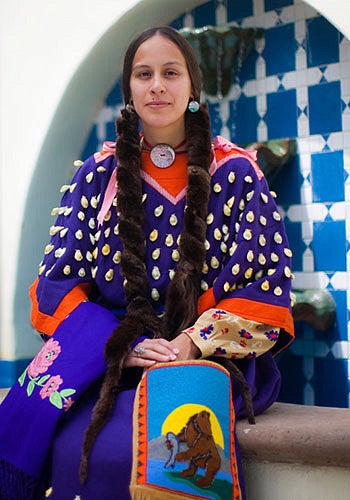
Michelle M. Jacob, Ph.D. (Yakama), professor of Indigenous Studies and codirector, Sapsik'ʷałá (Teacher) Education Program, conducts the Auntie Way Writing retreat. This year, with the support of Vice President for Equity and Inclusion, Yvette Alex-Assensoh, and Vice Provost of Graduate Studies and head of the newly created Division of Graduate Studies, Krista Chronister, 140 UO graduate students will participate in the retreat.
“It is wonderful that we have university leadership investing in the success of our faculty and graduate students as writers who are advancing the university’s vision of social justice through their work. As academics, the most powerful way we can advance our voices and visions is through writing, and to do so in a supportive, collective environment is very meaningful. We are shifting the very culture of the university through this work. Academic writing is typically thought of, and engaged as, an individualistic and competitive endeavor. In contrast to that Western-centered approach, Indigenous cultural values teach us about the power and joy of working collectively, which is more sustainable in the long-term and honors our Indigenous teachings which our people have used to be in respectful relationship with place since time immemorial. Our success in the Auntie Way Writing Retreat is further evidence of why Indigenous methodologies are important in the academy.”
- Michelle M. Jacob, Ph.D. (Yakama), professor of Indigenous Studies and codirector, Sapsik'ʷałá (Teacher) Education Program

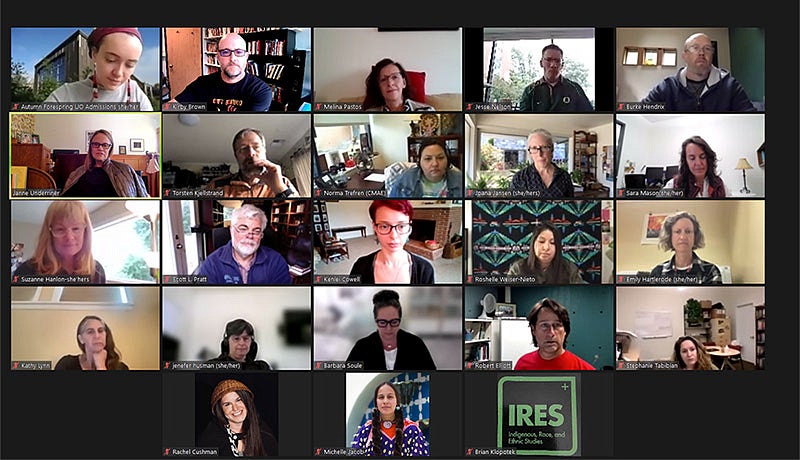
Read more about the Native American Strategies groups and how community has provided support this past year, the challenges and hopes they have now and for the future, and more.
2021-2022 Common Reading

The 2021-2022 Common Reading work is Braiding Sweetgrass: Indigenous Wisdom, Scientific Knowledge, and the Teachings of Plants by Robin Wall Kimmerer. As a botanist, Robin Wall Kimmerer has been trained to ask questions of nature with the tools of science. As a citizen of the Citizen Potawatomi Nation, she embraces plants and animals as our oldest teachers. In Braiding Sweetgrass: Indigenous Wisdom, Scientific Knowledge, and the Teachings of Plants, Kimmerer brings these two lenses of knowledge together through her memoir of living in the natural world and practicing heart-centered science.
Kimmerer will join the UO campus on January 24-25, 2022. UO Libraries is providing unlimited access to digital copies of Braiding Sweetgrass for UO students, faculty, and staff.
UO Library access to Braiding Sweetgrass

Jordan Schnitzer Museum 2021-22 Common Seeing: Meeting Points
Jordan Schnitzer Museum corresponding Common Seeing expands the conversation of this year’s Common Reading through the visual arts. The 2021-22 selection, Braiding Sweetgrass by Robin Wall Kimmerer addresses humanity’s responsibility to the natural world through its author’s observations as an enrolled member of the Citizen Potawatomi Nation, academically trained botanist, and mother. This year’s Common Seeing brings together works by nine contemporary Native artists that speak to these issues and each’s experiences as individuals and members of their communities. Featured artists include Natalie Ball (American, Black, Modoc and Klamath), Joe Feddersen (Colville Confederated Tribes), Bud Lane (Siletz), Joey Lavadour (Walla Walla/Métis), Brenda Mallory (Cherokee), Lillian Pitt (Warm Springs, Wasco, and Yakama), Gail Tremblay (Mi'kmaq and Onondaga), Kay WalkingStick (Cherokee), and Shirod Younker (Coquille, Coos, and Umpqua, b. 1972).

Native American Resources
Campus Resources
UO Libraries Resources
Scholarships


